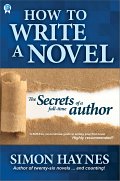How to build a successful fiction writing career
1) Churn out approximately one million words of fiction. This is your practice session. Can be short stories, stillborn novels, crappy stories you just can't finish, fan fiction, anything. Blog posts and email don't count towards the total, but they're all good practice for typing what you mean to say and learning to use the language professionally.
If a million words sounds like a lot, how long do you think it takes to become good enough at the violin to play in a top symphony orchestra? And what makes you think writing is any easier? The competition is even more intense, because unlike violin playing
almost everyone seems to think they can write a book without practice.
This is going to sound harsh, but if you don't care whether your emails and blog posts are grammatically correct and reasonably free of typos, then you may not care enough about the language to be a writer. Take a minute to think about the impression you're leaving with the people you write to. They will probably be the first you tell about your book, and if they're used to shoddy grammar and typos in your emails they might jump to the conclusion that your book is more of the same.
For fiction, you don't query agents until you have a finished manuscript.
(I just know there's going to be a typo or a grammar issue in that paragraph, even though I've read it nine times. When a writer gets up and makes a point about the language, it's only natural that they screw up in the process and make themselves look like idiots. In my defence, I just spent 8 months editing and revising an 80,000 word manuscript.)
2) Write a good strong book and polish it well. Sometimes it's hard to spot the flaws in your own work, so ask first readers to pick holes in it. Accept their comments gracefully, because if you argue they won't make any more. And if you're not going to listen to them, why ask them to read it in the first place?
'No unsolicited queries' means they don't want to hear from you at all.
Years ago I read something for a contact of mine, and I did a thorough job on it, too. I ended up with several pages of queries, but every point I raised was argued down to the wire, until eventually I gave up. That author wasn't after feedback, they just wanted kind words and a pat on the back. The experience wasn't a complete waste of time because it taught me how tough life is for editors, and it taught me to explain to readers what I needed from them.
3) Query agents - at least 100 before you give up on that particular novel. Did I ever get this one wrong. I thought 'No unsolicited submissions' meant they didn't want to hear from anyone. What it means is they want to see a letter first, telling them about you and your book. You enclose an SSAE, and they'll get in touch if they want to see more. (Sample chapters or the whole manuscript.)
Never pay an agent! Agents take a cut from the publisher's payment to you. You don't pay them up front for anything.
4) While doing 3), do 2) again
You're a writer, not an envelope stuffer. If you do get published, you'll discover that your editor is interested in your current book but everyone else wants to know what your next project is. So make sure you have one.
Now repeat 3-4 until you get an agent. If it takes you two years you might have 2 or 3 completed novels, and they get better the more you write.
If an agent suggests an editor who will help tidy up your manuscript for a fee, say no thanks and find another agent.
Repeat 2 until the agent sells your book
If you DO get an agent your best bet is to write more books. If they discover they can't sell the work they signed you up for, they might have better luck with your next project. It might take them 12 months to give up on the first book, so wouldn't it be great to have another to offer them?
Repeat 2 until the agent and/or publisher ditches you.
If agent, find another one. If publisher, let your agent find another one. You should be writing.
Skipping any of these steps will reduce your chances considerably.
Glenda Larke suggested another step... READ READ and READ some more. How can you possibly hope to write a publishable manuscript if you're not absorbing others just as fast as you can?
Please remember that none of my articles are meant to discourage. In fact, they're all written for the me of ten years ago, the writer who was ready to take the next step but didn't know what that step was.
About the author: Simon Haynes is the author of over 25 novels. He also designed and created
yWriter.
Stay in touch!
Follow me on
Facebook or Twitter
